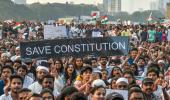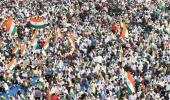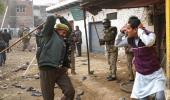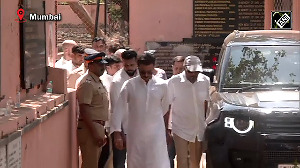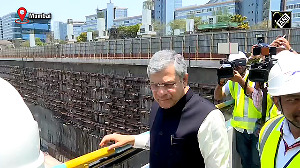'If you are opposed to the nationwide NRC, you should oppose the NPR.'

At his speech at the Ramlila Maidan on December 22, Prime Minister Narendra Damodardas Modi claimed there had been no discussion on the National Register of Citizens.
Modi's rally coincided with the news that the Centre has allocated around Rs 3,500 crore (Rs 35 billion) for updating the National Population Register. The process shall commence from April and will be completed by September.
What is this NPR? And is there a co-relation to the NRC?
"The 2003 rules do not provide for any protection of personal data collected in the NPR. So how can you embark on this exercise? Even if you have to do it from a legal point of view, you need to have a separate law," Prasenjit Bose, economist and Convenor, Joint Forum against NRC, tells Syed Firdaus Ashraf/Rediff.com.
Every country has a national citizen identity card. A country like Pakistan has a citizen card. So what is wrong if Indians too have one for security reasons?
We already have many cards. We have a voter identification card, an Aadhaar card. Does Pakistan have an Aadhaar card? They don't have anything similar to that. Since when have we started learning things from Pakistan?
What is the purpose of the citizen card? If I want to vote, I have a voter ID card.
If I want to avail of government benefits, I have an Aadhaar card.
So why do I need another card? What exactly is the purpose of this national identity card?
To declare yourself a citizen of India.
I am already an Indian citizen. Why do I have to prove my citizenship again?
To get rid of Bangladeshis who infiltrate India.
Where are they? I had filed queries under the RTI (Right to Information Act) to the Union home ministry and they could not provide a concrete number as to how many infiltrators are present in India. All this is bogus propaganda.
If you see the Assam experience, the whole thing started by saying there are 50 lakh (5 million) illegal migrants.
In 30 years after the Assam Accord, you could deport only around 2,500 people to Bangladesh.
Even the Assam National Register of Citizens, which is full of errors, excluded 19 lakh (1.9 million) persons.
So what happened to the claim of 50 lakh 'infiltrators'?
There is a belief that there are 10 lakh (1 million) Bangladeshi infiltrators in Mumbai.
There is deliberate, motivated, propaganda going on for decades by the right-wing, especially by the BJP (Bharatiya Janata Party and the RSS (Rashtriya Swayamsevak Sangh). Many people have succumbed to that propaganda.
In reality, they have never been able to provide any credible estimate and evidence of a large number of illegal Bangladeshi infiltrators.
Why should we believe in the BJP's propaganda? One should always go by what are established facts.
When a government cannot provide jobs to its own people, this is a typical way to divert attention by stating that outsiders are coming and taking away your jobs.
Is there a link between the National Register of Citizens and the National Population Register?
The utterances of central ministers are creating unnecessary confusion. Prime Minister Modi said the NRC has never been discussed whereas (Home Minister) Amit (Anilchandra) Shah has been talking about a nation-wide NRC for the last six months.
The provision for a nation-wide NRC is already there in the 2003 amendment to the Citizenship Act and the rules framed under that Act, the Citizenship Rules 2003.
As a first step for creating the nationwide NRC, there will be a National Population Register where all usual residents -- all those staying in a place for over six months or would be staying in that place for six months -- would be first enlisted through a house-to-house enumeration exercise.
Then step two follows, which is the identification of doubtful citizens and the rules are very unclear on what would be the basis to identify someone as a doubtful citizen.
As per the rules, you will have a process where doubtful citizens would be identified and then notices would be sent to them to submit their documents and so on.
In the third step, those who fail to establish their citizenship, their names will be excluded and eliminated to create the NRIC or nationwide NRC.
In other words, the NPR minus doubtful citizens will be equal to the NRC.
Then the fourth step is to give national identity cards to all those whose names are in the NRC.
This four step process is described in the Citizenship Rules, 2003 which has been framed under Section 14A of the Citizenship Act which was inserted in 2003 by the Atal Bihari Vajpayee government.
So, as per the rules, the NPR is the first step towards the NRC.
The prime minister at his Ramlila Maidan rally in Delhi said there will be no NRC.
That is a lie. I have nothing more to say.
The Acts and rules are all available in the public domain. Anybody can Google it and read what is there.
Why don't we have a Census this time rather than a NPR?
The Census is governed by the Census Act 1948. The Census has been happening since 1951 onwards. It is a necessary exercise from a development point of view.
We do need data on population growth, demographic and socio-economic trends in terms of literacy, health, employment and so on. So the Census is absolutely necessary.
But the Census Act provides protection to the data which has been collected from individuals and that data cannot be accessed by anybody.
When I give my data to Census officers, I am confident that it will remain confidential.
On the other hand, the NPR, which comes from the 2003 Rules, is a separate exercise which has got nothing to do with socio-economic development.
The NPR and NRC's whole purpose is to identify illegal migrants through this four-step process.
I will be asked about my parents's birth date and birth place in the NPR and that data will not remain confidential.
What the government has done is that they have clubbed the Census and NPR together.
In the Census there are many more questions than the NPR, like what kind of house do you live in and what kind of drinking water do you get.
The questions in NPR relate to your personal details and your family origin. That is the purpose of the NPR.
But...
(Interrupts.) The problem is that while there is a separate Act or legislation for the Census which was enacted in 1948, there is no separate Act or legislation for the NPR.
The Citizenship Amendment Act of 2003 does not talk of the NPR. It talks about the nationwide NRC or better known as the NRIC (National Register of Indian Citizens).
When they framed the rules in 2003, they introduced the NPR. So the NPR does not have statutory backing.
We have filed a petition in the Kolkata high court where we have questioned whether a government can do something like this.
Do we need to give our biometric for the NPR?
They have talked about seeding Aadhaar data, which gives rise to an additional set of questions.
The NPR came in the 2003 rules and subsequent to that there was the Aadhaar law. That law was challenged in the Supreme Court and subsequently the Supreme Court of India gave a judgment on Aadhaar.
That judgment introduced safeguards regarding personal data and privacy of individuals. The Right to Privacy was upheld as a Fundamental Right.
However, the 2003 rules do not provide for any protection of the personal data collected in the NPR. So how can you embark on this exercise?
Even if you have to do it from a legal point of view, you need to have a separate law. You cannot do something like this without legislative or statutory backing.
State governments have refused to cooperate on NPR, for instance West Bengal and Kerala. Will the NPR process proceed further?
Not only West Bengal and Kerala, but many other state governments are also considering non-cooperation with the NPR.
If the state governments feel the central government is making them do things which will create chaos in society, they will naturally resist.
Let's be clear, the NPR is the first step towards the NRC. If you are opposed to the nationwide NRC, you should oppose the NPR.
